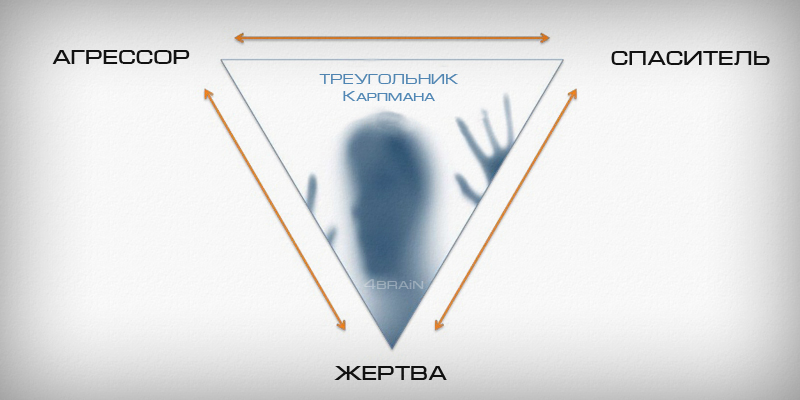Karpman Drama Triangle: How to Manage Communication Roles
Hello everyone, this is Stalilingus. Today, let’s discuss the topic of the “Bermuda Triangle of Communication,” or more accurately, the Karpman Drama Triangle.
The Karpman Drama Triangle is a model of interaction that describes three roles people often take on in communication: Victim, Persecutor, and Rescuer. The key point is that these roles can change at any time—switching roles is just a matter of time.
If you find yourself in a codependent conversation or want to create one, and you need to consciously and successfully take on a certain role, this model can help. But be aware: any attempt at “manipulation” will fall apart if you accidentally slip into the Victim role.
Description of the Roles
The Victim Role
- Facial Expression: Looks scared, expresses sadness and fear.
- Behavior: Anxious, like a student about to be scolded for a bad grade.
- Typical phrases: “Why does this always happen to me?”, “What did I do to deserve this?”, “If it weren’t for you, everything would have worked out for me,” “I’m feeling bad right now because of you.”
The Victim blames everyone but themselves—life, friends, the boss. Usually, they lack self-confidence and complain about life, comparing their failures with others.
Pros of the Victim role: Minimal responsibility. The Victim doesn’t take responsibility for anything and blames others. They don’t see the need to solve or do anything, just saving their energy and waiting for a Rescuer.
Cons of the Victim role: Victims are often despised and not respected. The Persecutor can control the Victim as much as they want until a Rescuer appears.
How to impose this role: Just start saying things like, “Who asked you to interfere?”, “If it weren’t for you, everything would have worked out.” In short, make the person feel guilty, then push for what you really want.
The Persecutor Role
- Facial Expression: Anger, dissatisfaction, disgust.
- Behavior: “Attacking”
- Typical phrases: “This is not up for discussion, I’ve made my decision and you need to follow it,” “What’s going on here?”, “Why did this happen here?”
The Persecutor role is often taken by parents, bosses, teachers, or bullies. It’s beneficial to be the Persecutor as long as there is no Rescuer around. If a Rescuer appears, you might become the Victim, and the Rescuer becomes the new Persecutor.
Pros of the Persecutor role: Strong, assertive position. Things go the way the Persecutor says.
Cons of the Persecutor role: Excessive emotionality, vulnerability to the situation. The Persecutor’s position is usually short-sighted, and they are easily provoked. Their behavior is very predictable.
How to impose this role: It’s easier to impose the Persecutor role from the Rescuer’s position. Just act very confidently, intervene in the situation, start with a meaningful silence, then convince the Victim they’re now safe and provoke them.
The Rescuer Role
This role is less obvious, but the Rescuer is calm and satisfied. You can recognize them by their tendency to give advice and act like they know best—in short, the kind of person you might want to avoid.
Pros of the Rescuer role: Noble intentions—wants to help and make the world more harmonious.
Cons of the Rescuer role: If someone is unhappy, the Rescuer ends up being blamed. People often respond to the Rescuer’s actions with, “It’s all your fault!” or “Why did we even listen to you?” In the end, the Rescuer regrets getting involved, and if you time it right, you can turn them into the Victim.
How to impose this role: Just ask for help and explain why only they can help you.
How to Avoid Getting Stuck in the Triangle
In general, you need to develop self-awareness and avoid codependent relationships. If you do get caught up in them, it’s hard to get out. If you find yourself in the triangle, try to impose the role that benefits you, and learn to control and manage your roles. Don’t react to provocations—learn to provoke others instead. Refuse to enter the Karpman Triangle whenever possible to strengthen your independence.
How Not to Become the Victim
Don’t whine or blame your mistakes on others—take responsibility for yourself. If something in your life isn’t right, it’s your fault and yours alone. You might ask, “But what if, for example, a hurricane hits me? Am I still the Victim?” Yes, and yes again—don’t be where hurricanes happen.
How Not to Become the Persecutor
If someone provokes you, don’t rush to react. First, analyze what consequences your actions might have. Ignore the provocation if taking on the Persecutor role won’t do you any good.
How Not to Become the Rescuer
Learn to say “no” if someone is trying to manipulate you. Help others only if you truly want to, not because someone else needs it.
Control yourself and live life to the fullest.
Stalilingus



